The female psychologist running Risley men's prison
- Published
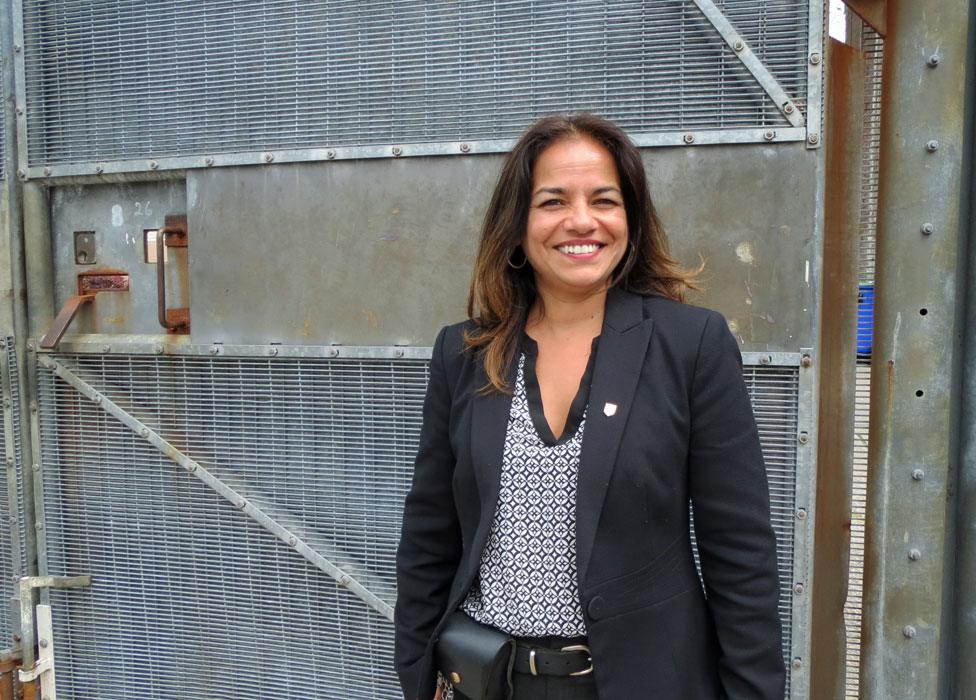
Running a men's prison is a tough job, and if you don't look like a stereotypical prison governor, part of your job is challenging people's expectations. So how does Pia Sinha do it, asks the BBC's Siobhann Tighe.
"What are youse doing here? What youse doing here?"
Over the din of HMP Risley, a prisoner shouts at us from the other side of a metal gate. He's spotted my microphone and wants to know what's going on.
The governor, Pia Sinha, is showing me round but stops to chat to him. He doesn't hold back. He tells her: "This jail's rubbish."
It's almost a year since 44-year-old Sinha took charge here. People often do a double-take when this 5ft three-quarters-of-an-inch tall Asian woman introduces herself as the governor.
"You get a lot of raised eyebrows and some people openly say: 'You're not what I expected,'" Sinha says.
It doesn't offend her. She takes it as a compliment.
When she started her career in prisons almost 20 years ago, her friends were horrified. They weren't used to hearing workplace stories like the ones Sinha would tell them.
Even today, she says, the atmosphere is an "acquired taste". She's often heckled by the prisoners, although she treats it as mere bravado.
"It can be very intimidating and unpleasant but when I walk on to the wings, I need to feel comfortable," she says.
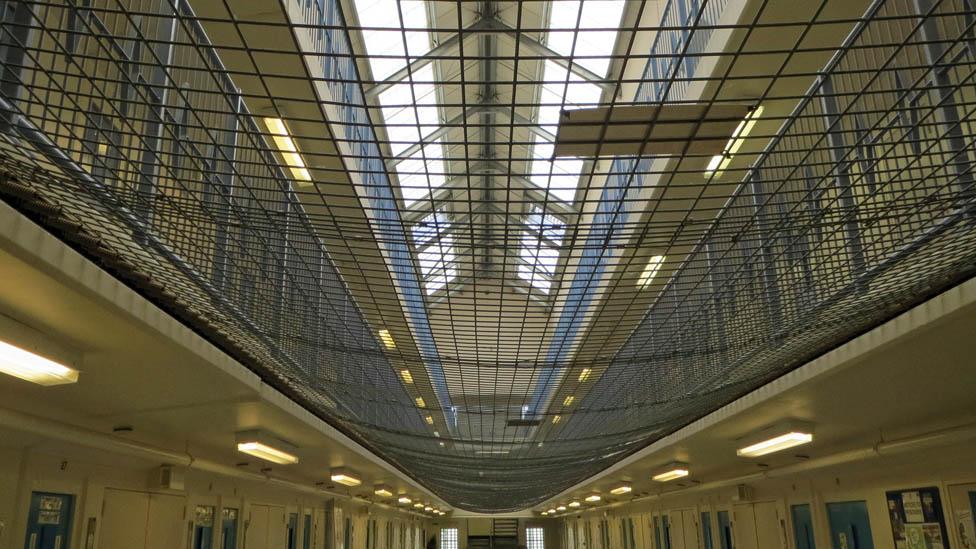
HMP Risley, near Warrington, Cheshire, is a men's resettlement prison, which means that prisoners here are nearing release.
In late 2016, a few months after Sinha took charge of it, an inspection report identified a number of failures, external at the prison. A fifth of prisoners felt unsafe, it said, and "it was not a sufficiently respectful prison".

Find out more
Siobhann Tighe's report from Risley prison can be heard on Woman's Hour, on Radio 4, at 10:00 on Friday 21 July

"It was a fair report," says Sinha. From her point of view it was well-timed. She wasn't in her post when the inspectors visited. Arriving afterwards meant she had a clear action plan to make improvements.
"Risley feels chaotic at times," Sinha admits. One of the challenges staff face are "nearly epidemic" levels of novel psychoactive substances (NPS), also known as "legal highs", including Spice.
When I'm there, Sinha catches up with some of her staff. Prison officers report that three prisoners have taken Spice today, and it's not even lunchtime. No-one's died at HMP Risley from taking the drug, but there have been deaths in other jails.
"You see people under the influence of NPS just walking around and if they seem OK, you just leave them alone," says Sinha of the zombie-like trance the drug can induce.
But often they're unwell and it's necessary to involve healthcare professionals.

"We're talking about an unknown quantity here." Her voice trails off.
Mechanisms for smuggling drugs inside are very sophisticated, she says, and staff are "constantly battling" a steady stream of banned substances, Sinha says. "Constantly battling," she repeats.
Sometimes drones are used to get drugs over the prison walls, but the guards have had some success in catching them.
"We're good at spotting drones. We're getting better and better. We've actually employed someone to just watch the skies and we're intercepting them, but it's an everyday struggle."
Prison is an environment where the unpredictable can happen at any time.
Sinha's job is one of crisis management. She and her staff have to deal with self-harm, violence, bullying and antisocial behaviour. Much of the chaos can be traced back to drugs in one way or another, she says.
There are even comic moments. The day before we met, I confirmed our interview on the phone but Sinha was in a rush and had to go. A prisoner was up a tree.
"This happens now and again, and we call it an 'incident at height'," Sinha says.
It was a hot day, and one man in the exercise yard didn't want to come back inside, so scaled a tree.
"There's a serious point to this because potentially it's life-threatening," Sinha says. So the prison went into Command Mode and specially trained staff talked him down.
"The lesson is that we need to trim the branches so it's harder to climb trees," says Sinha.
When Sinha tours her prison she's constantly locking and unlocking gates. For prison staff, your keys and your key pouch around your waist become part of you, she says.
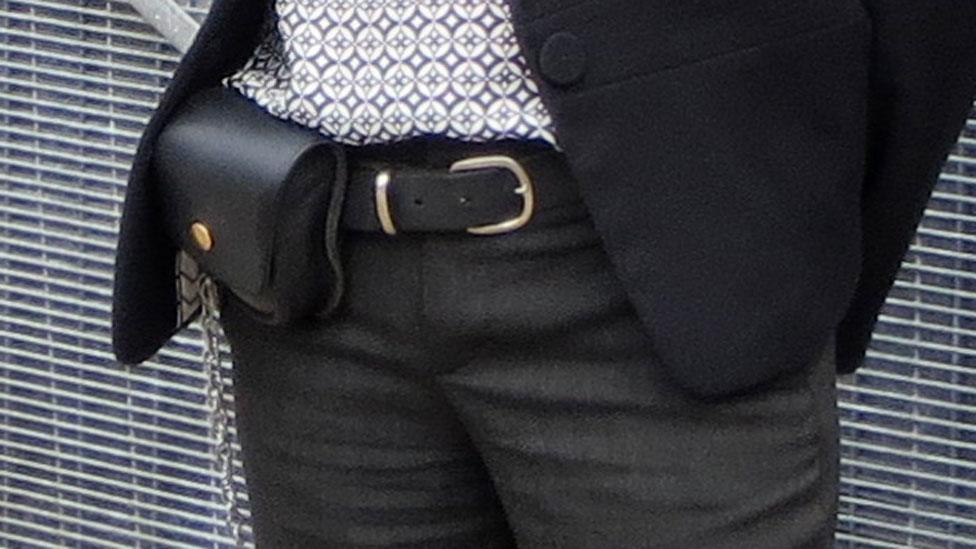
"This becomes an extension of your body," Sinha explains, jangling her keys. "When I first started, I'd go home and I'd try to lock myself in and out of my bedroom because I was so used to doing it."
Sinha began her career as a psychologist at HMP Holloway, a woman's prison in London which closed last summer. Since then she's worked in women's and men's prisons and institutions for young offenders. Her first governorship was the adult male prison, HMP Thorn Cross in Cheshire.
As she's risen through the ranks, Sinha has spent less time with prisoners and more time managing staff. She's also learned to adapt her approach.
"Even though Thorn Cross is a male prison there was scope to use my female dominant skills," she says.
"It was a place where you can be creative - the focus was overtly on resettlement. But when I came to HMP Risley it was like starting again because it had a very male culture. It required masculine skills. I had to be clear in my communication. There is no room for discussion and dialogue when you're expected to give strong leadership."
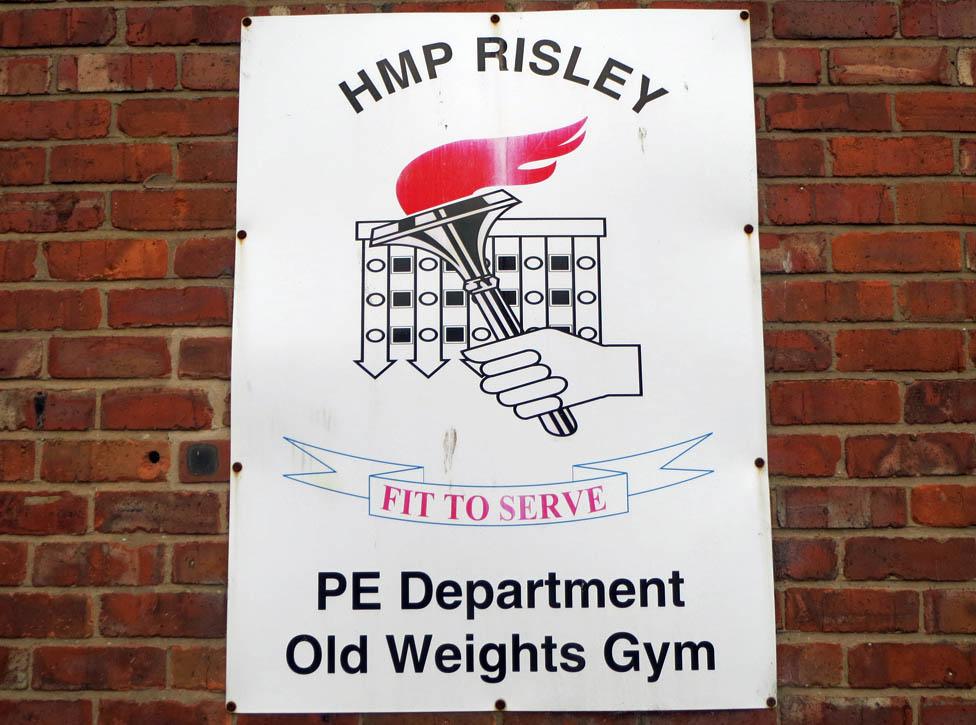
Does spending all her working day in a high-security environment make her feel like a prisoner at times, rather than the one in charge?
"Yes, sometimes. You're not able to bring your mobiles into work. You can't do any personal admin during lunch breaks or quiet times. We have our own intranet, but there's limited access to the internet. It's very, very firewalled."
Prison, she says, "shuts off the outside world, whilst the world wants to remain blissfully unaware of what happens inside".
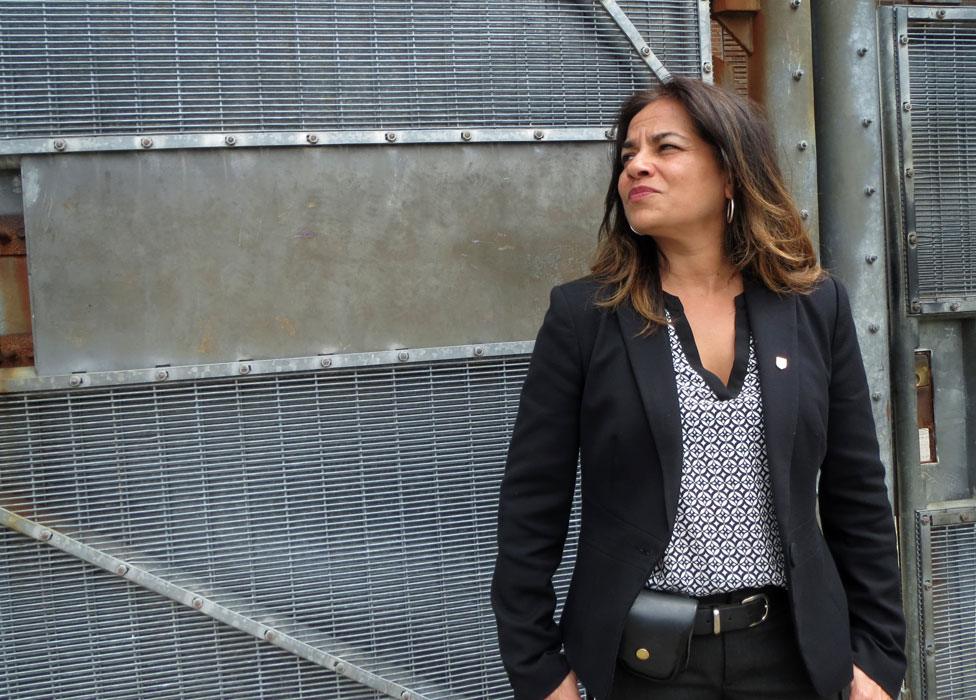
Part of a governor's job is knowing how to deal with a bored and restless inmate who tells you that your prison is rubbish.
Sinha responds by asking whether it's because he's struggling. It's not that, he insists. Where has he come from, she asks.
"I've been in loads of different jails," he says. "I've done seven years before."
The governor asks him whether she can help in any way, especially as he's not working, spending all his time behind his door.
Now he's polite, and turns down her offer.
"It's all right," he says, and then, "Have a nice day." Just as you would if you passed someone in the street.

Join the conversation - find us on Facebook, external, Instagram, external, Snapchat , externaland Twitter, external.